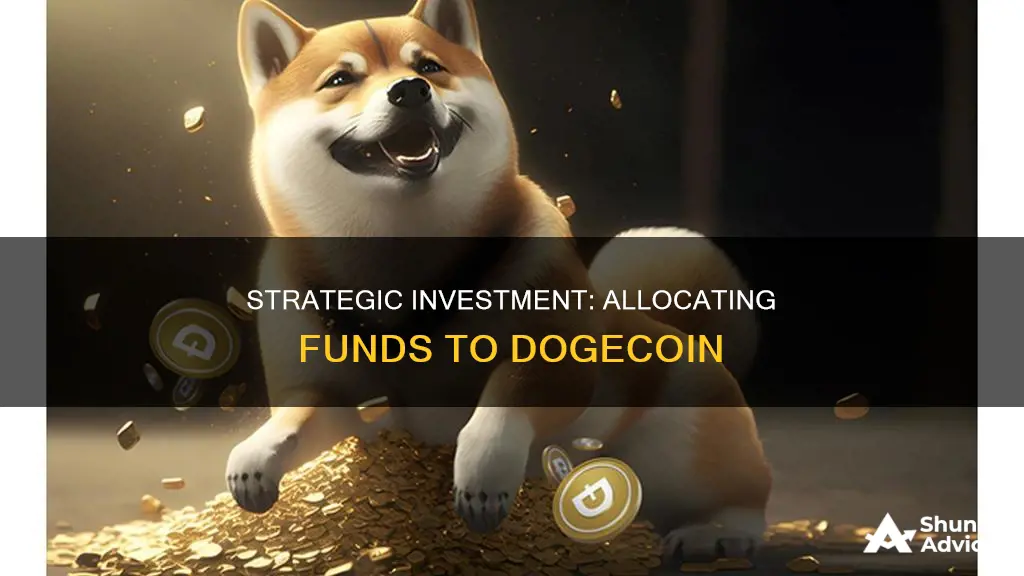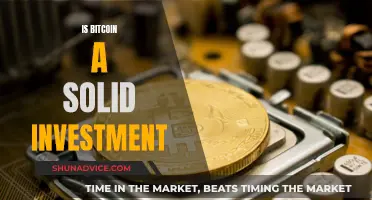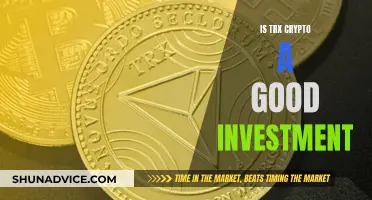
Dogecoin is a cryptocurrency that was launched in 2013 as a joke based on a popular meme character -- a Shiba Inu dog. It has since gained a large amount of attention and a devoted online community. Dogecoin is a controversial cryptocurrency because, unlike Bitcoin and many other cryptocurrencies, it does not limit its supply to avoid inflation. Instead, Dogecoin has an infinite number of coins. Dogecoin's value is extremely volatile and is often influenced by celebrity endorsements, particularly by Elon Musk. For example, on April 1st, 2021, Musk tweeted that he would be sending a literal Dogecoin to the literal moon, causing Dogecoin's value to rise by about 32%. Dogecoin's value can also be influenced by social media trends and viral videos. For instance, a 2020 TikTok video that encouraged users to invest $25 in Dogecoin caused its value to surge. Dogecoin's value has also been supported by its community, which has been involved in several public news stories, including fundraising efforts for the Jamaican Bobsled Team and NASCAR driver Josh Wise.
| Characteristics | Values |
|---|---|
| Type | Cryptocurrency |
| Launch Date | December 2013 |
| Founders | Billy Markus, Jackson Palmer |
| Current Price | $0.125951 |
| Market Capitalization | over $70 billion |
| Highest Price | $0.69 USD |
| Celebrity Endorsements | Elon Musk, Snoop Dogg, Mia Khalifa, Gene Simmons |
| Celebrity Supporters | Mark Cuban |
| Best for | Short-term traders, entertainment value |
What You'll Learn

Dogecoin's value and volatility
Dogecoin is a highly volatile cryptocurrency. In fact, like most cryptocurrencies, it is subject to extreme volatility. Dogecoin's value has fluctuated significantly since its creation in 2013.
Initially, Dogecoin experienced two short-lived price jumps. The first occurred when the token was launched, with its price soaring by 1,061% in 15 days. The second took place in March 2017 during the early stages of a crypto bull market, with the price rising by 1,494%. However, this was followed by a period of decline, with doge prices falling below $0.001 for the remainder of 2017 until they found support from bullish investors in November of that year.
Dogecoin's value saw a significant increase in 2021, largely due to the influence of Tesla CEO Elon Musk, who tweeted about the cryptocurrency multiple times and shared memes featuring a Shibu Inu dog. Musk's support for Dogecoin led to a surge in interest and trading volume, causing its price to soar. By May 2021, Dogecoin had reached an all-time high of $0.74, a 9,884% gain since January of that year.
However, Dogecoin's value has declined since its peak in 2021. As of August 2024, its price is around $0.10, with a 24-hour trading volume of $491.49 million and a market cap of $14.45 billion. Dogecoin's current market performance shows a decrease of 3.70% in the last 24 hours and a 4.47% decrease over the last month.
Despite its volatility, Dogecoin has exhibited lower annualized 30-day realised volatility compared to Bitcoin, a more established cryptocurrency. This shift in relative price stability may be due to a lack of investor interest in alternative cryptocurrencies and the dominance of Bitcoin in the crypto market.
Dogecoin's value is heavily influenced by media hype and the support of high-profile individuals like Elon Musk. However, given the lack of practical use for the coin and the absence of a supply cap, it is difficult to predict its long-term success.
Physician's Guide to Bitcoin Investment
You may want to see also

How much to invest for short-term gains
Dogecoin is a highly volatile cryptocurrency that has experienced significant price fluctuations since its creation in 2013. While it began as a joke based on a viral internet meme, it has since gained a large following and even reached an all-time high market cap of around $70 billion in May 2021, largely due to the influence of Elon Musk.
When considering how much to invest in Dogecoin for short-term gains, it is important to recognise that it is a highly speculative and risky investment. Its value is largely influenced by social media and market trends, and it does not have any notable intrinsic value. As such, it is crucial to only invest what you can afford to lose.
- Timing your Entry and Exit: Due to Dogecoin's volatility, timing your entry and exit points is critical. Monitor the crypto market, news, social media, and any other factors that might influence Dogecoin's price. Look for periods of high volatility and potential price surges, such as those driven by Elon Musk's tweets or other celebrity endorsements. Set clear targets for taking profits and cutting losses to manage your risk.
- Short-Term Trading Strategies: Consider employing short-term trading strategies such as scalp trading, day trading, or swing trading. These strategies involve holding Dogecoin for short periods, from a few minutes to a couple of weeks. Scalp trading focuses on small price movements and quick profits, while day trading and swing trading aim for larger price swings but require more time and analysis.
- Diversification: To manage risk, consider diversifying your crypto investments across multiple assets. By allocating smaller amounts to each cryptocurrency, you can reduce the impact of potential losses on your overall portfolio.
- Dollar-Cost Averaging: Instead of investing a large sum all at once, consider investing smaller amounts of money regularly over time. This strategy, known as dollar-cost averaging, can help reduce the impact of price volatility and lower your average entry price.
- Stop Losses and Limit Orders: Utilise risk management tools such as stop-loss orders to automatically exit your positions if Dogecoin's price falls below a certain level. Conversely, you can use limit orders to automatically sell and take profits if the price reaches your target.
- Stay Informed: Stay up to date with Dogecoin-specific news, such as developments in its blockchain technology, community initiatives, or partnerships. These factors can positively influence its value and help you identify potential entry or exit points.
In summary, when investing in Dogecoin for short-term gains, it is crucial to recognise the high level of risk involved. Only invest what you can afford to lose, and consider employing risk management strategies and diversification to mitigate potential losses. Stay informed about market trends, crypto news, and developments specific to Dogecoin to make more informed investment decisions.
Bitcoin Code Bot: Scam or Legit?
You may want to see also

The risks of investing in Dogecoin
Dogecoin is a cryptocurrency that was initially created as a joke or parody of Bitcoin. It was started as a meme in 2013, based on the popular Shiba Inu dog meme. Dogecoin has received a lot of attention on social media, with some even calling for it to reach $1.00.
While Dogecoin has enjoyed surges in value, it is a highly risky and volatile investment. Here are some of the risks to consider before investing in Dogecoin:
Volatility and Lack of Stability
Dogecoin is extremely volatile, and its value can go down as quickly as it goes up. Cryptocurrencies are highly speculative, and their value is based on what someone is willing to pay for them at a particular point in time. Dogecoin's value has fluctuated significantly, and it is challenging to predict its future price movements.
Infinite Supply and Inflation
Dogecoin, unlike Bitcoin, has an infinite supply. There is no maximum cap on the number of Dogecoins that can be mined or produced. Dogecoin miners earn 10,000 Doge per block, and new blocks are created every minute, resulting in a daily influx of 14,400,000 new tokens. This infinite supply can lead to inflationary pressures and decrease the value of existing Dogecoins over time.
Lack of Decentralization
Dogecoin has a low level of decentralization, with only 1090 nodes in its network, compared to nearly 10,000 nodes in Bitcoin's network. This low node count makes Dogecoin more susceptible to a 51% attack, where a single person or group gains control of more than 50% of the network. Such an attack could put investors at risk of losing the entire value of their investment.
Concentration of Ownership
A small number of wallets hold a large proportion of Dogecoins. 0.002% of Dogecoin wallets hold two-thirds of the total coin supply. This concentration of ownership gives a small handful of individuals significant control over price fluctuations and liquidity in the market. This uneven distribution of coins can lead to unpredictable price movements and increased volatility.
Regulatory and Consumer Protection Risks
Cryptocurrency investments, including Dogecoin, often fall outside the scope of traditional financial regulations. They may not be subject to the same consumer protection measures as other types of investments. The Financial Conduct Authority (FCA) in the UK has warned that consumers risk losing all their money when investing in cryptocurrencies and that these investments are not protected.
Complex and Unregulated Nature
The complexity of cryptocurrency products and services can make it challenging for consumers to fully understand the risks involved. There is no guarantee that Dogecoin or other cryptoassets can be easily converted back into cash. The ability to convert cryptoassets back into cash depends on market demand and supply, which can be highly unpredictable.
In conclusion, investing in Dogecoin comes with significant risks. It is a highly volatile and speculative asset with an infinite supply and a low level of decentralization. The concentration of ownership and regulatory uncertainties further add to the risks. Potential investors should carefully consider these factors and conduct thorough research before deciding to invest in Dogecoin.
The Cost of Entry: Bitcoin Investment Start-Up Fees
You may want to see also

Dogecoin's long-term viability
Dogecoin is a controversial cryptocurrency that was launched in 2013 as a joke based on a popular meme character—a Shiba Inu dog that speaks in broken English. It was created by software engineers Jackson Palmer and Billy Markus, who left the project in 2015, citing toxic elements within the community.
Dogecoin is a decentralised, open-source cryptocurrency. It is built on blockchain technology, which verifies transactions and prevents double-spending attempts, providing a secure way to transfer value without a centralised intermediary system. Dogecoin transactions are much faster and cheaper than Bitcoin transactions.
Dogecoin is an inflationary coin, meaning there is no maximum supply. This is in contrast to Bitcoin and many other cryptocurrencies, which limit supply to avoid inflation. Dogecoin has an infinite number of coins, and there are currently more than 130 billion in circulation.
Dogecoin has a passionate community, and its fans are known as the 'Shibes'. The community has been involved in several public news stories, including fundraising efforts for the Jamaican bobsled team, who they helped to send to the 2014 Winter Olympics.
Dogecoin has a market capitalisation of over $70 billion, and its value has increased by 2,400% in the past year. However, its long-term viability is questionable. It does not have a clear competitive or technical advantage over other cryptocurrencies, and its value is largely determined by its popularity.
Dogecoin's popularity is partly due to celebrity endorsements, most notably by Elon Musk. Musk has tweeted about Dogecoin several times, causing its price to surge. However, the value of Dogecoin plummeted by more than 75% in less than two months after Musk appeared on Saturday Night Live in May 2021.
Dogecoin is a highly speculative and volatile investment. Its popularity may not sustain it indefinitely, and its unlimited supply model presents long-term risks compared to more established coins. The broader crypto market's performance will also significantly impact Dogecoin's trajectory.
While Dogecoin has the potential to reach over $1 in the next few years, it remains a risky investment. Potential investors should fully understand the technology, tokenomics, and risks involved with speculative assets like meme coins.
The Future of Bitcoin: Invest or Avoid?
You may want to see also

How to buy Dogecoin
Dogecoin is a decentralised cryptocurrency that was created as a parody of Bitcoin. It has gained significant attention due to its meme-inspired branding and support from celebrities such as Elon Musk. While some see Dogecoin as a promising crypto asset due to its surges in value and growing mainstream acceptance, others warn that it is highly volatile.
If you are looking to buy Dogecoin, here is a step-by-step guide:
Step 1: Sign up for a crypto exchange
Create an account on a well-known cryptocurrency exchange, such as Coinbase, Kraken, or Binance. Provide information like your email address, name, and phone number.
Step 2: Verify your account
Verify your account with personal details like proof of address. You may also need to undergo a Know Your Customer (KYC) verification process, which involves submitting government-issued identification documents and a proof of address.
Step 3: Deposit funds to your account
You can deposit money into your cryptocurrency account through various methods, including credit or debit cards, bank transfers, or wire transfers, depending on the exchange's policies and your jurisdiction.
Step 4: Find DOGE, check the market price, and buy
Search for Dogecoin (DOGE) on the exchange, check its market price, and make a purchase. Generally, it takes less than a minute before you can see DOGE in your crypto exchange wallet. After making the purchase, you can transfer your Dogecoin to other wallets.
Alternative Ways to Buy Dogecoin
Peer-to-Peer Marketplaces
You can buy Dogecoin through peer-to-peer (P2P) marketplaces that allow you to buy directly from other individuals instead of using a centralized exchange. These platforms match buyers and sellers and provide a secure escrow system to facilitate the transaction.
Exchanging with Other Forms of Crypto
If you have other cryptocurrencies, such as Bitcoin or Ethereum, you can exchange them for Dogecoin on exchanges like Uniswap and Kraken. This method can be faster and more cost-effective than buying DOGE with fiat currency.
Who's Betting Big on Bitcoin Globally?
You may want to see also
Frequently asked questions
The amount of money you invest in Dogecoin depends on your risk tolerance and financial situation. Some people, like billionaire Mark Cuban, have compared investing in Dogecoin to buying a lottery ticket. It's important to remember that Dogecoin is a highly speculative investment with no intrinsic value.
Dogecoin may be a good short-term investment for those willing to gamble, but it is not recommended for long-term investors due to its high volatility and lack of long-term benefits.
Dogecoin has had significant price swings since its creation in 2013. It reached an all-time high of $0.73 before Elon Musk's SNL debut in 2021 and has also experienced sharp declines, such as in 2023 when it was down 15.1% in a month.
The primary risk of investing in Dogecoin is the potential for loss, as there is no guarantee that the value will increase over time. Additionally, Dogecoin has no supply cap, which means there is no limit to the number of Dogecoins that can be in circulation, impacting its potential value.
Dogecoin has a fun factor and a low cost of entry, making it an attractive investment for those new to investing. It also has a loyal community of supporters and has been endorsed by celebrities like Elon Musk, Snoop Dogg, and Mark Cuban.







